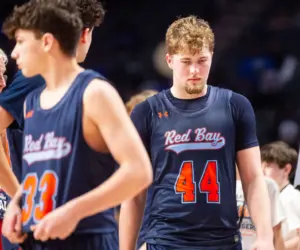Community corrections aid court system
With prisons throughout the state operating above capacity, officials have to look at other ways for defendants to serve their time for the crimes they commit. In this area, that usually means a sentence with the Franklin County Community Corrections program.
First created in 2000 through a grant obtained by the program’s former director, Eugene Pierce, and former Circuit Judge Sharon Hester, Director Shea Madden said Community Corrections is basically an alternative sentencing program the state looks at to alleviate overcrowding in the state’s penitentiary system.
People on Community Corrections are still considered state inmates, but they are allowed to serve their term without actually being in jail.
“The program is for non-violent offenders with cases like drug or theft of property cases,” Madden said. “Each person must be approved by the Department of Corrections, the district attorney and a judge before they can become part of the program.”
Even though a defendant’s sentence isn’t being physically served out in a jail cell, people on Community Corrections are still subject to many rules and regulations like random drug testing, good behavior, holding down a job unless disabled, paying court-ordered fines and restitution, a 10 p.m. curfew, not being allowed to leave the state and a bi-weekly check-in at Community Corrections office inside the Franklin County Courthouse.
Madden said other provisions like a GPS monitoring device and substance abuse programs can be added when necessary.
“The purpose of this program is to transition people back into society,” he said. “Most of these crimes, even if they’re theft cases, are alcohol- or drug-related in some way, so if you can get these people in a treatment program and have them supervised and accountable, it’s more likely they are going to stay clean.”
Franklin County District Attorney Joey Rushing said the Community Corrections program is a great alternative to prison for some offenders.
“I have seen many success stories from Community Corrections because they have so many rules that must be followed,” Rushing said. “The offenders receive help and have varying degrees of supervision depending on the case.”
Rushing said new laws actually prevent prosecutors from sending probationers with first-time technical offenses like curfew violations or failing to report back to prison, so Community Corrections is important to punish these offenders without them returning to prison.
“The program is a valuable tool we can use to help these people stay out of trouble in the future,” Rushing said.
Madden said they receive people into the program upfront, which means the judge sentences a person to the program on a first offense or if they’ve been on probation before; straight out of the prison system, which must be approved by the DOC or a judge; or people who have committed probation violations, which means the imposed prison sentence for violating his or her probation would be served through Community Corrections instead.
All of these people will become part of Community Corrections or other programs that fall under the Community Corrections umbrella like court referral and drug court, which are directed by Sheryl Plott.
“Only 45 counties in Alabama have Community Corrections programs, but every county has a court referral program because of the 1990 Mandatory Treatment Act that stated people charged with an alcohol or drug offense had to complete a court referral program,” Madden said. “Most of the time the court referral will be an educational program like the effects of alcohol abuse or drug use, but sometimes the court referral is for a treatment program in cases of substance abuse, DUIs, possession of marijuana or other drugs.”
Drug court is an optional program offered to first-time offenders with substance abuse issues. The program lasts a minimum of 18 months, 12 of which are spent in treatment and the other six are spent in aftercare with Community Corrections.
“All of these programs – Community Corrections, court referral, drug court – are offered as a second chance because everyone deserves a second chance,” Madden said. “But if they violate any of the rules and regulations here, there’s only one place for them to go: back to prison.
“We do all we can to rehabilitate these people, help them find jobs, get clean and get back into society as a productive citizen.
“Sometimes that happens and you’ll have someone come back and thank you for the help they received. Some people are sent back to prison because they couldn’t follow the rules. All we can do is offer that second chance. It’s up to them to take advantage of it.”








